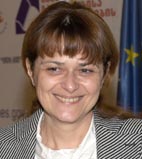Education reform underway but problems remain
By Salome Modebadze
Monday, August 27


In May 2012, Maia Miminoshvili was removed from the directorship of the National Examination Centre (NAEC) because of her “principle incompatibility” with the policy of the MES during the reform process. The former NAEC team left their positions too as a sign of solidarity towards Miminoshvili, subsequently establishing an association on educational issues.
Saakashvili said that although people were afraid that the exams would fail this year, these 150 students have proved the opposite.
“This education reform – taking university exams without corruption, is one of the main achievements me, my friends and my comrades can boast about,” he said, stressing that no one should ever return Georgia to the criminal past when students had to pay tens of thousands of dollars to study at the leading universities.
Encouraging them to compete with one another in their professional life, Saakashvili expressed his confidence that they will become very deserving citizens. “Our goal is to give the authority to you, and to those who will never compromise freedom,” he said, adding that many countries have failed in copying the Georgian examination system because “fairness is the first criterion for a better life.”
He said Georgia has not made any compromise during a war with Russia in 2008. “We will always do whatever is right,” he said, highlighting that Russia is amazed with Georgia’s progress but they can do nothing despite their huge oil and gas supply, because of their “unfair system.”
Illustrating that Batumi represents a symbol of change in Georgia, Saakashvili said that poverty in Georgia remains and many people feel miserable.
“For me, the best, fastest and fairest method for overcoming poverty is labor, and [most importantly], a lot of learning,” the president said, explaining that this is the way he was brought up by his parents and how he is raising his own children.
But he said everyone, especially members of government, should care not only for their own families but the country as well. He addressed the soon-to-be university students explaining that they are the generation for which the acting government has been building and creating everything for all these years.
Minister of Education and Science, Khatia Dekanoidze, summarized the results of the Unified National Exams last Saturday. 24, 501 out of 35, 361 registered students entered university; this is 5.3% higher compared to previous exams. The list of successful students is available at the official webpage of the ministry. Dekanoidze said there were no excesses during the examination process and everything was calm. “The Unified National Exams were carried out in this format for the last time,” Dekanoidze said, stressing that beginning next year, high school graduates will have new entrance exams based on an 8+1 model where students will have to pass a test on general skills together with the 8 school subjects.
Meanwhile, Maia Miminoshvili emphasized that everything for the university entrance exams was prepared by her team this year and said that time will show the success of the new examination system. However, Miminoshvili told The Messenger that it does not matter how many exams high school students take, the Georgian education system faces a lot of problems that cannot be solved by improved examination system alone.
Miminoshvili said that by implementing the new 8+1 exam system, then Minister Dimitri Shashkin, tried to please the students and their parents. The former NAEC director said these multiple choice tests that require a minimal level of competence, cannot prove the knowledge of the university entrants.
“Why do we want exams if we do not want knowledge?” Miminoshvili said, pointing to the deplorable situation at many schools. She said that her Association of Education Policy and Research is working on an education development document that focuses on the problems at different levels of education.
Stressing that they will cooperate with the MES, Miminoshvili said that it is the MES who should finally implement the policy and also challenge the Ministry to participate in open debates about the educational issues. Miminoshvili explained that criticism is not enough, as it is time to act so that her association will “force” the MES to take right steps to improve the situation.
